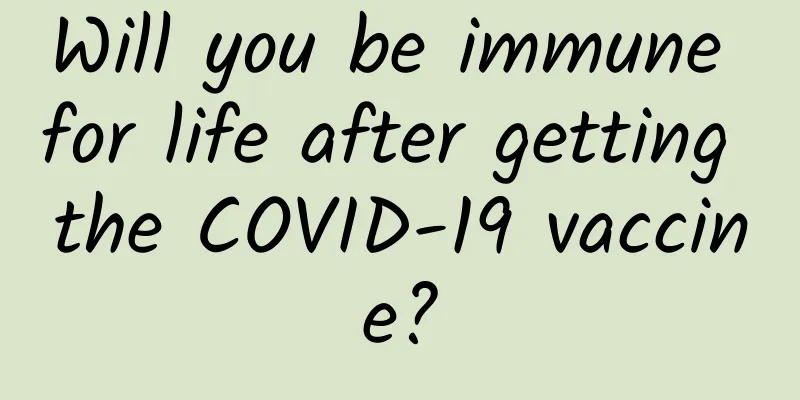Will you be immune for life after getting the COVID-19 vaccine?

|
Popular saying: Vaccination can not only activate your own immune system to produce antibodies, but also activate cellular immunity and produce immune memory. Cellular immunity is a permanent memory, so as long as you have been vaccinated, you will be immune for life and you will never need to be vaccinated again. Fake rumors Verification points: 1 Due to individual differences, not everyone can produce antibodies (humoral immunity) 100% after vaccination. The "neutralizing antibodies" among antibodies are the most important components for resisting pathogens. Therefore, without antibodies, it is impossible to resist viral invasion. 2 Cellular immunity is a very popular term recently, but the dose-effect relationship between cellular immunity and protective effect is still unclear, and it is hard to say how much effect cellular immunity can play. 3 Even if neutralizing antibodies against the new coronavirus are produced, they will gradually decay over time. When neutralizing antibodies are not enough to cope with the "siege" of pathogens and the supply of new neutralizing antibodies cannot keep up, the immune system will be defeated and lead to infection. 4 Even if there are antibodies and cellular immunity, it is still possible for some people to be infected due to insufficient immunity. A long time ago, when cowpox was rampant, there was a rumor that people who were vaccinated with the cowpox vaccine would turn into cows. Because the cowpox vaccine is made from things collected from the cow's body, it will combine with the body after entering the body, turning the vaccine recipient into a cow! Although this rumor sounds ridiculous, it is true, and many artists have created art based on it. When people don’t know enough about something, it’s easy to have such unrealistic imaginations. Nowadays, the COVID-19 vaccine is closely related to our health and life. It has been promoted for nearly half a year, but various rumors have been circulating on the Internet, trapping many people. All of this also stems from a lack of understanding. Today we will analyze these rumors one by one, give everyone a comprehensive understanding of the new crown vaccine, and dispel doubts in their hearts. 1. The new coronavirus keeps mutating, so the vaccine is useless? Rumor has it: The new coronavirus, like the influenza virus, is an RNA virus, and the characteristic of RNA viruses is that they are easy to mutate, which makes the vaccine ineffective. In the future, it is very likely that the new coronavirus vaccine will be like the influenza vaccine, and the strain will have to be updated every year to deal with new viruses that become popular after mutation. This statement seems scientific, but it has many problems: ① Many common viruses, including measles virus and rabies virus, are RNA viruses and are also mutating, but the original vaccines are still effective for a long time. ② Since the global COVID-19 pandemic began, there have been continuous in vitro experiments, clinical trials and other research results confirming that COVID-19 vaccines (including vaccines of various processes) are effective against mutant viruses. For example, animal trials of inactivated vaccines in China found that the serum produced after vaccination can neutralize a variety of mutant viruses[1]. For example, in South America, where mutant strains are interspersed, the vaccine also has a clear protective effect[2]. ③WHO Chief Scientist Soumya Swaminathan said: The mutation rate of the new coronavirus is much slower than that of the influenza virus. Even if a serious mutation occurs and the existing vaccine becomes completely ineffective, we humans still have time to develop a new vaccine, or even find ways to eradicate the disease before that. ④ Another issue to consider is that the direction of mutation is random, and the probability of an unfavorable mutation is much higher than a favorable mutation. It is not like what everyone thinks, that it will definitely become more and more serious. Therefore, it is purely excessive anxiety that vaccines are ineffective against mutated viruses. Even if vaccines become ineffective, humans have ways to deal with them. 2. Will large-scale vaccination of the new coronavirus vaccine accelerate virus mutation and render the vaccine ineffective? Rumor has it that after large-scale vaccination, the vaccine can only prevent some virus subtypes, and the virus subtypes that cannot be prevented will become dominant viruses, spreading and mutating more violently among the population. In other words, if the viruses that the vaccine can prevent are eliminated, the viruses that cannot be prevented will become the main force and start to cause trouble. Fake verification: Fake! This theory of "survival of the fittest" seems reasonable, but it is actually a misunderstanding. There are many ways for viruses to mutate, the most important of which is mutations when circulating between hosts, but this requires a prerequisite that the vaccine coverage rate is insufficient. The purpose of large-scale vaccination is to block the cycle as soon as possible and reduce the risk of mutation. In other words, vaccines will not accelerate virus mutations, but will reduce the possibility of mutations. In addition, as mentioned above, there is currently no evidence that existing vaccines will be ineffective against the virus, but there is evidence that the vaccines are effective against some mutant strains. From a scientific perspective, we do not rule out the small theoretical possibility that in the future, controlling some viruses will lead to the prevalence of other mutant strains. But on the other hand, through this epidemic, humans have made a qualitative leap in vaccine development, vaccination promotion, and prevention and control measures. Therefore, even if the mutant virus re-emerges in the future, we will be able to respond in time and reduce related losses. In summary, the claim that large-scale vaccination will cause or accelerate virus mutation is not reliable. 3. Will you be immune for life after getting the COVID-19 vaccine? Popular saying: Vaccination can not only activate your own immune system to produce antibodies, but also activate cellular immunity and produce immune memory. Cellular immunity is a permanent memory, so as long as you have been vaccinated, you will be immune for life and you will never need to be vaccinated again. Reality check: basically no chance. Unfortunately, this is just a beautiful imagination, for the following reasons: ① Due to individual differences, not everyone can produce antibodies (humoral immunity) 100% after vaccination. The "neutralizing antibodies" among antibodies are the most important components for resisting pathogens. Therefore, without antibodies, it is impossible to resist viral invasion. ②Cellular immunity is a very popular term recently, but the dose-effect relationship between cellular immunity and protective effect is still unclear, and it is hard to say how much effect cellular immunity can play. ③ Even if neutralizing antibodies against the new coronavirus are produced, they will gradually decay over time. When neutralizing antibodies are not enough to cope with the "siege" of pathogens, and the supply of new neutralizing antibodies cannot keep up, the immune system will be defeated and lead to infection. ④ Even if there are antibodies and cellular immunity, it is still possible for some people to be infected due to insufficient immunity. In summary, it is unlikely to provide lifelong immunity after vaccination, but precisely because of this, it becomes particularly important to adjust public health strategies, modify vaccination procedures (such as increasing the number of injections), and develop new vaccines. Although human wisdom may not be able to completely defeat the virus, it can continuously reduce risks. 4. Will the COVID-19 vaccine destroy the human immune function? Popular belief: Some people believe that vaccines are viruses (whether dead or alive), and as long as they are injected into the body, they can destroy the human immune function, making people more susceptible to illness or harmful to the body. Truth Check: Nonsense! Let’s first talk about how vaccines work (taking inactivated vaccines as an example): ① The virus was beheaded in public (its pathogenicity was cut off), but it was still wearing the clothes it wore when it committed the crime. ②The corpse continued to be paraded through the streets. Some of the immune cells responsible for inspection carefully observed what the dead virus looked like and what weaknesses it had, and told the other immune cells responsible for protection. ③The Immune System Defense Department begins to train special troops (T cells) to prepare for the next hand-to-hand combat, and the workers in the Quartermaster Department (B cells) mass-produce weapons and distribute them to everyone to defend their homes. ④ Next time a virus comes, everyone will become a soldier and defeat the virus directly. To put it simply, vaccination can "upgrade" your body's virus library and enhance immunity to specific pathogens. It will not only not destroy the body's immune function, but will make the immune function better. 5. Could the COVID-19 vaccine cause cancer? Rumor has it that getting the COVID-19 vaccine could cause cancer because the viruses and various ingredients in the vaccine, as well as the cells used to culture the virus, are all related to cancer. Fact check: Alarmist! The rumor that vaccines cause cancer is not the latest one. Some people have proposed the "vaccine-causing cancer theory" for a long time, but there is no evidence so far - or even no possibility. Let's take the inactivated COVID-19 vaccine as an example. The inactivated COVID-19 vaccine is mainly composed of inactivated COVID-19, inactivated virus β-propiolactone, Vero cell residues and other ingredients. Let's analyze them one by one. ① Inactivated new coronavirus: Not to mention the inactivated one, even the live one has not been found to be carcinogenic. What’s more, the only viruses that may be related to cancer, such as hepatitis B virus, human papillomavirus, and Epstein-Barr virus, are DNA viruses. RNA viruses have not been found to be related to tumors. ② β-propiolactone for inactivating viruses: Virus inactivators are carcinogenic, but during the vaccine preparation process they will be removed as much as possible through purification technology to a very low level, so at this time we cannot talk about toxicity without considering the dosage. ③ Residual Vero cells: Some people say that vaccines can cause cancer because the virus in the vaccine is cultured with Vero (African green monkey kidney) cells, which can proliferate indefinitely in vitro. Therefore, they are considered to be the same as cancer cells. If there are any residues, they may cause cancer? In fact, we have not found any evidence that Vero cells are carcinogenic to date, and even directly injecting Vero cells into animals cannot cause cancer. Moreover, in the process of vaccine preparation, not only will Vero cells be destroyed, but the Vero cell protein and DNA residues in the vaccine stock solution must also be further removed through purification, and the residues are controlled to "picograms" (1/100 million grams). Not only will no complete Vero cells remain, but even the remaining residues have no biological activity. ④ Aluminum hydroxide adjuvant: Some people say that the aluminum adjuvant in the vaccine contains aluminum, which may be bad for the body, but in fact the aluminum content in the vaccine adjuvant is extremely low, and may not even be as high as the aluminum content in food or tea, so there is no need to worry at all. ⑤ Disodium hydrogen phosphate, sodium dihydrogen phosphate: Look down at the ice cream or bread in your hand. They are here, and the content in the vaccine is even less. To sum up, the ingredients in vaccines are very safe and are even used in many foods. If they could cause cancer, they would not be used all over the world. 6. Can people with (skin) allergies or planning to get pregnant not get the COVID-19 vaccine? Rumor has it: People with skin allergies cannot get the vaccine, otherwise it will aggravate the symptoms. People planning to get pregnant also cannot get the vaccine, otherwise it may affect the child. The former is not entirely correct, and the latter is not correct at all! We need to be cautious about allergies - since the causes and severity of allergic reactions vary, we cannot generalize. Vaccination is generally not recommended for people with severe allergic symptoms or unexplained allergies, unstable control and persistent obvious allergic symptoms. The main consideration is that local reactions after vaccination may be confused with the original symptoms, or due to coincidence with other causes, are considered to be reactions caused by the vaccine. Therefore, for people with a history of allergies, they can be vaccinated normally if the cause of the allergy is clear, under stable control or cured. If serious conditions such as urticaria, angioedema, etc. are found after vaccination and the vaccine-related relationship (allergy to vaccine components) cannot be ruled out, subsequent doses should not be continued. As for whether vaccination during the pregnancy preparation period will affect the health of the fetus, in fact, before the vaccine is tested on humans, it will first be tested on animals, that is, reproductive toxicity studies. The results of animal studies show that long-term, high-dose injections of the vaccine will not affect the reproductive system, animal embryo development, or pregnancy outcomes, before the vaccine is approved to enter the next stage of clinical research. For humans, the new coronavirus vaccine has been used for more than a year, and hundreds of millions of people have been vaccinated in the country. No evidence has been found that the vaccine may affect pregnancy preparation - not to mention that modern vaccines have a history of more than a hundred years, and no evidence has been found that they have an impact on pregnancy preparation. The new coronavirus vaccine currently being used in the country can be safely administered to people planning to get pregnant. 7. Will the COVID-19 vaccine change human genes and turn people into genetically modified humans? Rumor has it that the vaccine contains virus-related ingredients, which will directly combine with the body's genes after being injected into the human body, changing the human genes and turning people into genetically modified humans. Reality check: Darwin roared: Nail the coffin lid for me, don't blame me if you can't suppress it. Human genetic material is DNA, and the new coronavirus is an RNA virus. It is not composed of reverse transcribed RNA, so it will not directly bind to the human body. This is the case for live viruses, not to mention inactivated viruses or virus components. To put it simply: humans have been eating vegetables for so many years, and there has been no genetic mutation to turn them into vegetative people... 8. Is it better to get immunity through disease than through vaccines? Popular saying: The antibodies produced after natural infection are higher and the immune response is better. The protection obtained through natural infection is more reliable than vaccination. Truth Check: Partially true, but the premise is that you are alive. People believe that natural infection will produce a better immune response than vaccination because there are indeed many diseases that can basically achieve "lifelong immunity" after natural infection. But one thing we have to consider is that although the mortality rate of the new coronavirus is not high compared to tumors or other serious diseases, it is about 2% (estimated from the latest statistical data on May 9, 2021). For the 98% of people, it may be okay (but many of them will have sequelae including loss of taste), but for these 2%, it means 100% death. In addition, in the natural environment, infected people are both disease patients and virus spreaders, which may not only directly endanger the people they come into contact with, but also cause the virus to circulate among the population, increasing the risk of mutation. Therefore, even if a vaccine is available, acquiring immunity through natural infection is both a gamble with one's own life and irresponsible towards the health of others. 9. Are inhaled vaccines more effective than injected vaccines? Myth: Inhaled vaccines can induce mucosal immunity, so they can get a better immune response than injected vaccines. Truth-checking: Maybe, but first of all, you need this thing. Many people discovered last year that there is a new "trivalent nasal spray influenza live attenuated vaccine" in China. Compared with the injected inactivated vaccine, this vaccine can not only induce blood immunity, but also produce mucosal immunity. What does it mean? For example, if a virus attacks a city (body), our injectable vaccine can effectively kill the enemy that has entered the city (in the blood), and try to prevent the city from falling; while the inhaled vaccine can not only allow soldiers to guard the city, but also throw logs and rocks from the city walls, greatly reducing the virus's chance of even entering the city! Looks great, doesn't it? But everything has its pros and cons. Generally, inhaled vaccines are attenuated vaccines, and the biggest risk of attenuated vaccines is that the vaccine itself has a very small chance of causing illness in the vaccine recipient. In this case, although the risk of the virus itself can be reduced by "modifying" the strain, it may still pose a potential threat to some groups with special health conditions, so there are certain restrictions on its application. What’s more, an inhaled COVID-19 vaccine has not yet been successfully developed, so for the time being it is safest to choose the existing vaccination. 10. Can eating and drinking water before getting the COVID-19 vaccine avoid adverse reactions? Popular saying: Drinking more water before getting the vaccine can promote metabolism, thereby reducing adverse reactions caused by the vaccine. Reality check: Drink if you want, but don't fantasize. Although many people seem to recommend drinking more water after vaccination, believing that drinking more water can reduce adverse reactions after vaccination, there is currently no conclusive evidence to prove that drinking water after vaccination can help reduce the risk of adverse reactions. The claim that drinking water before vaccination reduces the risk of adverse reactions after vaccination is even more groundless and there is no evidence. In fact, any vaccine may cause some adverse reactions, some of which are related to the vaccine, and some are related to factors other than the vaccine. The causes of adverse reactions are also related to the type of vaccine, physical condition, vaccination method, and even idiopathic factors (such as during the incubation period of the disease), and have little to do with drinking water. In short, drinking water is not a bad thing. Just don’t drink too much or feel thirsty before getting vaccinated. |
Recommend
Do you know why there is an age limit for myopia surgery?
During the consultation process at the Refractive...
Is moxibustion good for women during menstruation?
Moxibustion is a kind of Traditional Chinese Medi...
If the follicles shrink
Atrophy can occur in various parts of the human b...
Who is prone to ectopic pregnancy?
Every woman is very afraid of ectopic pregnancy, ...
How to treat menstrual pain
Many women experience body aches during menstruat...
Woman's groin massage technique
Girls often feel itching and pain in the perineum...
How many months of pregnancy is suitable for listening to prenatal education
During pregnancy, in order to better promote the ...
When elderly people have vision problems, don’t say it’s presbyopia
As they age, many elderly people will have vision...
"Predicting disease by blood drop" (3): Early warning of Alzheimer's disease from plasma proteomics
In the previous "Predicting Diseases by Drop...
How to eat hawthorn? How to make hawthorn wine and what are its effects?
Many people think that hawthorn tastes too sour a...
How should women take care of themselves after childbirth?
Many women become overweight after childbirth, so...
Side effects of Jie'eryin
Cleanyin wash is made from cnidium monnieri, worm...
Why does the elderly feel dizzy after giving birth?
Childbirth is a great test for women both physica...
A baby born after 2 months of pregnancy
Medical abortion has certain harm to the health o...









